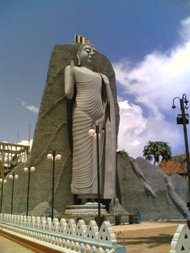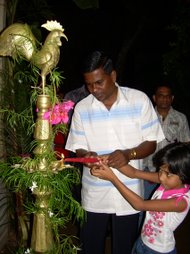LTTE’s behaviour contributes legitimacy to government's war- Daily Mirror
By Jehan Perera
The government has justified its military operations in the Silavathurai area of the north as being in the nature of a humanitarian operation. This is similar to the language used by the government a year ago when it sent in the army to open the irrigation sluice gates at Mavil Aru that had been shut by the LTTE. On that occasion the government had reason to be concerned about the fate of around 15,000 people whose livelihoods were affected by the LTTE blockade. In the case of Silavathurai the government’s stated rationale is the need to rescue about 6000 people from LTTE rule. The LTTE’s behaviour gives a measure of credibility to the government’s justification for expanding the theatre of war.
Reports emanating from the LTTE controlled areas of the north, and corroborated by international human rights organizations, speak of forced conscription by the LTTE. All families are required to provide one family member to the LTTE. Not even the traditional deference paid by Tamil society to education is holding back the LTTE at this time. High school children are being denied the right to pursue their university studies, but instead have to join the LTTE if the family has no one else to send. Human rights violations of this nature that keep the LTTE on the banned list of international terrorist organizations are useful to the government when it seeks to justify its military operations.
Defence Secretary Gotabhaya Rajapaksa has stated that the government will continue to prosecute the war against the LTTE in the north in the same manner as it did with success in the east. One of the salient features of the eastern military operations that is being repeated in the northern campaign would be the utilization of the air force to bomb LTTE targets and destroy them. Such a bombing campaign would, at the same time, induce the civilian population to flee those areas to escape the collateral damage which makes it easier for the army to move in and occupy those areas. Another salient feature would be relatively small scale precision ground strikes against LTTE targets, rather than the large scale movement of men and material.
There are several advantages that accrue to the government by following a strategy of low intensity warfare. The first is that it minimizes the loss of military personnel unlike in the case of large scale offensives that have often seen a large number of casualties going up to several hundred, in a single day’s fighting. Such heavy losses on the military battlefield can hasten discontent in the Rajapaksa government’s rural strongholds from where the bulk of the military and its electoral support is drawn. On the other hand, a low intensity war, with few casualties, as in the case of the eastern campaign, could continue to sustain support for the government in the rural areas.
A second advantage to the government is that a low intensity war promises to be longer rather than shorter in duration. Being embroiled in a patriotic war can be a life support system to a government that is proving unable to deliver economic benefits to the people due to its corruption and inefficiency. An electorate that might wish to throw out a government that is failing so badly to resolve their economic problems could be induced to be more patient in the context of war. The prevalence of war and the possibility of terrorist attack also give more legitimacy to strong arm tactics of the government that are intended to suppress democratic freedoms for the sake of security.
No escalation
This analysis suggests that, at least in the current context, the government will not wish to escalate the current military offensives in the north to any significant degree. The military offensives are likely to be restricted to specific areas of the north, such as Silavathurai, and not widen or intensify into full scale war. The government has learnt from the past that large scale military offensives are politically difficult to sustain due to the high cost factor, both in terms of military casualties and economic cost. This may explain the government’s oft repeated position that the current phase of war is likely to continue for two to three years.
On the other hand, the war strategy of the government has taken its greatest toll on the very people whom the government claims to wish to liberate and rescue from the LTTE. The aftermath of the eastern military operations shows that the eviction of the LTTE has not brought normalcy back to the lives of the people of the east. During the government’s military offensives, large numbers of them had to flee their homes and end up in refugee camps for displaced persons. Tens of thousands have yet to be resettled, and tens of thousands find that their homes are either destroyed or damaged beyond their capacity to repair. In addition, with the threat of LTTE infiltration back into those areas still high, the east continues to be highly militarized and life is insecure for the people.
Unfortunately, the current military operations in the north that are aimed at rescuing the people from the LTTE are unlikely to yield anything more positive than they have in the east. The likely scenario is the displacement of thousands of people from their homes, the destruction of many homes, and limited government efforts at reconstruction. The Silavathurai campaign in the north has already displaced over a thousand people. In addition, keeping the newly recaptured territories secure from LTTE infiltration will pose enormous logistical difficulties, and will require a heavy military presence that will continue to make life insecure for the people.
But tragically, so long as the majority of people accept the logic that the LTTE has no genuine interest in a negotiated peace settlement within the framework of one country, those who can show military success against it will be at an advantage over those who advocate anything different. The only way in which this logic can be changed is for the LTTE to demonstrate that they are serious about being prepared to negotiate a peaceful settlement that will ensure the rights of the Tamil people within a united Sri Lanka.
Marga study
A recent study by Dr Godfrey Gunatilleke and Ms Myrtle Perera of the Marga Institute in collaboration with the National Peace Council has brought out the contradictions, inconsistencies and ambivalent attitudes towards the LTTE, the ethnic conflict and is solution, and yet also the potential for generating popular support for a political solution. The deliberative poll seeks to ascertain how the public would respond if they were better informed and had a better understanding of the issues that are the subject of the survey. Such deliberative polls have been carried out in Northern Ireland to help with the peace process. The majority of respondents from this deliberative poll, which was carried out in 18 of the country’s 25 administrative districts (excluding the north and including only Ampara from the east) would be reflective of Sinhalese and Muslim opinion.
According to the Marga study, 77 percent of the respondents think that the government needs to act on the basis that the LTTE will not give up their aim of an independent state of Tamil Eelam, and will not enter the democratic process. This leads as many as 84 percent of the respondents to agree that the government should concentrate on militarily defeating the LTTE and recapturing all the territory controlled by the LTTE. But an even greater proportion amounting to 89 percent believe that the LTTE will continue as a guerilla force and be a threat to peace and security even after suffering a comprehensive military defeat. But the respondents did not want the war to continue, with 99 percent of them agreeing that the prevailing state of war should be ended as early as possible and security restored in all parts of the country.
The bleak assessment of the vast majority of people in the efficacy of a military solution leads most of them amounting to 72 percent to conclude that the best guarantee of lasting peace is a political solution that all communities can accept and that includes the LTTE in a negotiated settlement in which they give up their demand for Tamil Eelam and enter into a multi-party democratic system. This would be the ideal solution, and implies that the people expect the government to put forward a political package to resolve the fundamentals of the ethnic conflict. Only a small proportion, less than 10 percent, rejected any form of devolution, including the existing provincial council system. The vast majority were in support of some form of devolution of power. As many as 95 percent agreed that the political solution should be just and fair to all communities and it should guarantee equal rights to all citizens in all parts of the country regardless of ethnicity or religion.
In summary, the Marga study showed that there is a large measure of agreement amongst the people on what has to be done to lead to sustainable peace. They may not believe that the LTTE can be brought into a political solution, but they wish they could. This desire of the people imposes an obligation on the LTTE to stop being ambivalent and prevaricating on the issue of a political solution within the framework of a united country. Phrases such as being prepared to consider a “viable alternative” to Tamil Eelam and being prepared to “explore” a federal solution to the ethnic conflict have to give way to more concrete solutions that the LTTE shows that they are amenable to. The readiness of 72 percent of the Sinhalese and Muslim respondents to envisage a future in which the LTTE is part and parcel of a restructured Sri Lankan polity reveals the space that is available for arriving at a political settlement that has public backing.
"Star Lanka Online" Our NEW Web site And Web TV Channel Launched
TFGE , The Future Global Educational Center Has Launched
the official web site, called
*** Star Lanka Online Dot Com ........................
www.starlankaonline.com will be completed in very near future....
*** Star Lanka Online TV Channel,..................
Just One Click ahead ...
Now you can watch "Star Lanka Online TV" channel broadcasts from Matara, Sri Lanka in most part of the day. Still we are keeping a test transmission also. There is a link right side of your hand to watch our TV channel. You can watch (Click On the Box) live channel on this site without going to another site to watch the TV. and also recorded parts, following the below link.
the official web site, called
*** Star Lanka Online Dot Com ........................
www.starlankaonline.com will be completed in very near future....
*** Star Lanka Online TV Channel,..................
Just One Click ahead ...
Now you can watch "Star Lanka Online TV" channel broadcasts from Matara, Sri Lanka in most part of the day. Still we are keeping a test transmission also. There is a link right side of your hand to watch our TV channel. You can watch (Click On the Box) live channel on this site without going to another site to watch the TV. and also recorded parts, following the below link.
Place your Own Ad Here
Tuesday, September 4, 2007
LTTE’s behaviour contributes legitimacy to government's war
Subscribe to:
Post Comments (Atom)





















































No comments:
Post a Comment